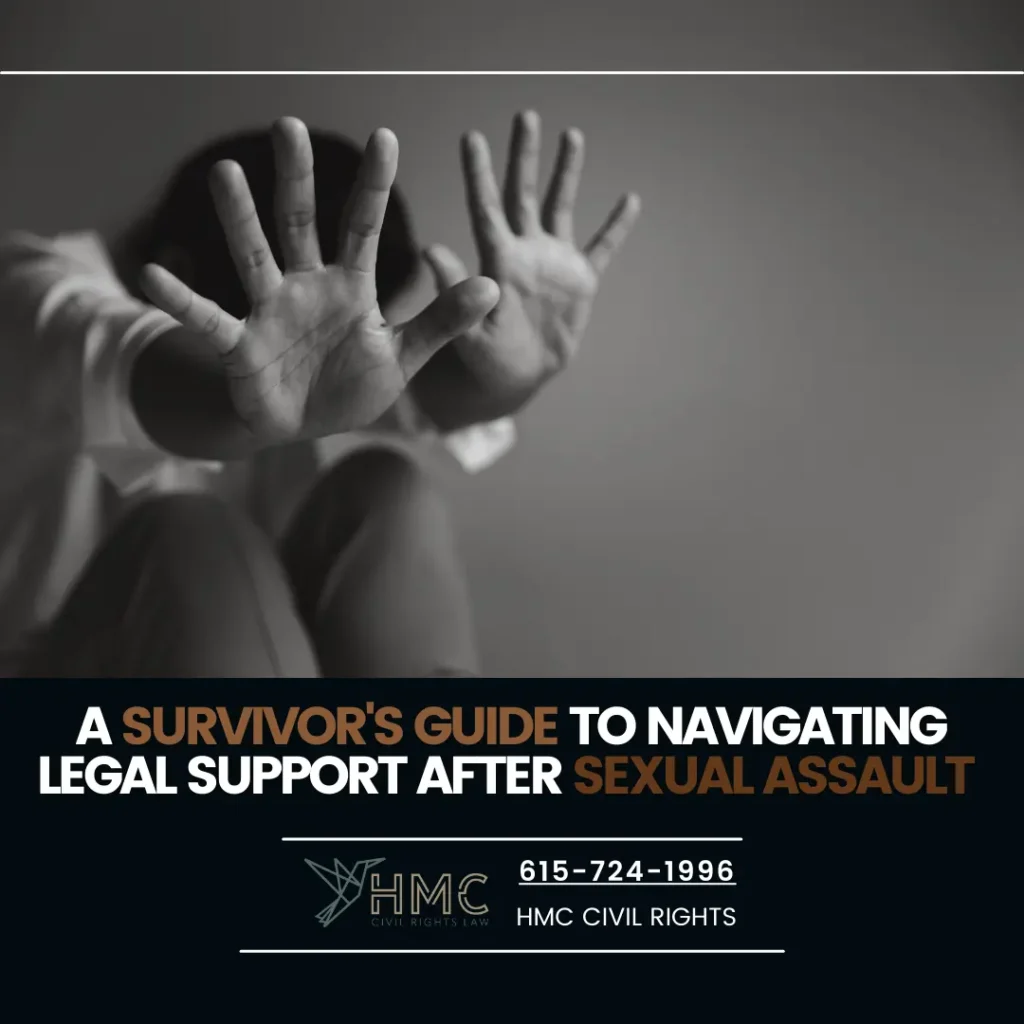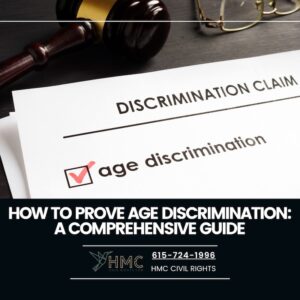Sexual assault is a traumatic experience that no one should have to endure, but if you’ve experienced it, you’re not alone, and legal support is available.
This guide is designed to help survivors navigate the often confusing and overwhelming process of seeking justice and finding legal support after sexual assault. We’ll provide step-by-step guidance to empower you on your journey towards healing and accountability.
If you or someone you know needs immediate legal support, contact HMC Civil Rights today. Our experienced civil rights attorneys are here to help. We specialize in civil rights cases, including discrimination and harassment, police misconduct, free speech issues, and more. With years of experience fighting for justice on behalf of our clients, we can provide the legal support you need to protect your civil rights. Call us today to learn how we can help you. Together, we’ll work to ensure that everyone is treated fairly and with respect
Immediate Steps After Assault
The moments and hours after experiencing sexual assault can be a blur of shock, confusion, and fear. When you can focus your thoughts and energy, there are essential steps you should take that can give you the best chance to protect yourself in the long term.
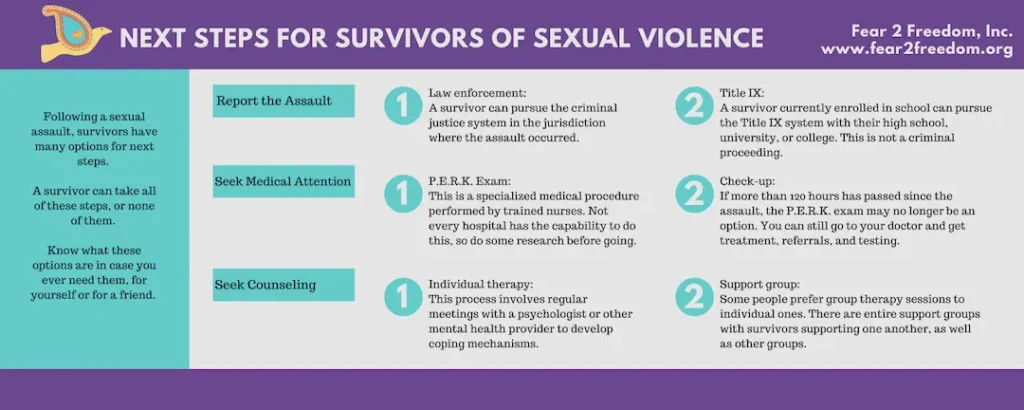
Image Source: fear2freedom.org
Here are the first steps to take:
- Ensure your safety: Get to a safe place as soon as possible, and reach out to someone you trust for support (remember that you can always call 911 in an emergency).
- Preserve evidence: Do not wash clothing or bedding, bathe, brush your teeth, eat, or drink. This could destroy evidence that could be crucial to your case.

Protection Orders
A protection order, sometimes called a restraining or stay-away order, is one of the most essential tools available to survivors of sexual assault. It is an official court document that orders someone (the defendant) not to contact you in any way and can also direct them to stay away from your home and place of work.
Types of protection orders vary by state, but there are three common types:
- Emergency Protection Orders (EPO): Typically granted within 24-48 hours of filing and lasts for a few weeks.
- Temporary Protection Orders (TPO): Lasts up to 90 days after a hearing is held in court.
- Permanent Protection Orders (PPO): Can last up to five years as long as the defendant lives in the same state.
Anyone can file for an order of protection – including family members, friends, or even employers – but they must be prepared to appear in court and provide evidence that justifies it.
To obtain a protection order, contact your local courthouse or police station for more information and assistance with the filing process.
Need help filing a protection order? Reach out to HMC Civil Rights for a free case review with our dedicated civil rights attorneys. Let us guide you through the legal process.
Victim Compensation
Victim compensation provides financial support to survivors of sexual assault to assist with medical bills, lost wages, counseling expenses, and other related costs.
Eligibility requirements vary by state; if you are interested in applying for victim compensation, check your state’s website for more information on qualifications and the application process.
Reporting the Assault
After considering your safety and preserving evidence, you may choose to report the assault to seek justice and protect others from similar experiences. There are two primary options for reporting sexual assault: law enforcement and campus authorities (if the incident occurred on a college campus).
If you choose to report the incident, it’s essential to understand that you may be asked some difficult and personal questions by law enforcement or campus officials. You can bring an attorney with you for support during this process. Having someone who can provide emotional assistance throughout the investigation and court proceedings is also helpful.
Seeking Medical Attention
After the assault, it’s important to seek medical attention to check for any physical injuries and obtain preventive medications that can help reduce the chances of obtaining an STI.
Your healthcare provider will conduct a medical exam and collect evidence from your body that may be used in the investigation. This process may feel intrusive, so you have the right to ask as many questions as you need to understand what is happening. Your healthcare provider should be understanding and compassionate, so don’t hesitate to speak up for yourself.
After the exam, your healthcare provider may provide medications or referrals for further treatment. Following their instructions is vital for your physical health and safety.
Understanding Legal Terms
To understand the legal process, it’s important to familiarize yourself with some of the key terms that will come up during your proceedings.
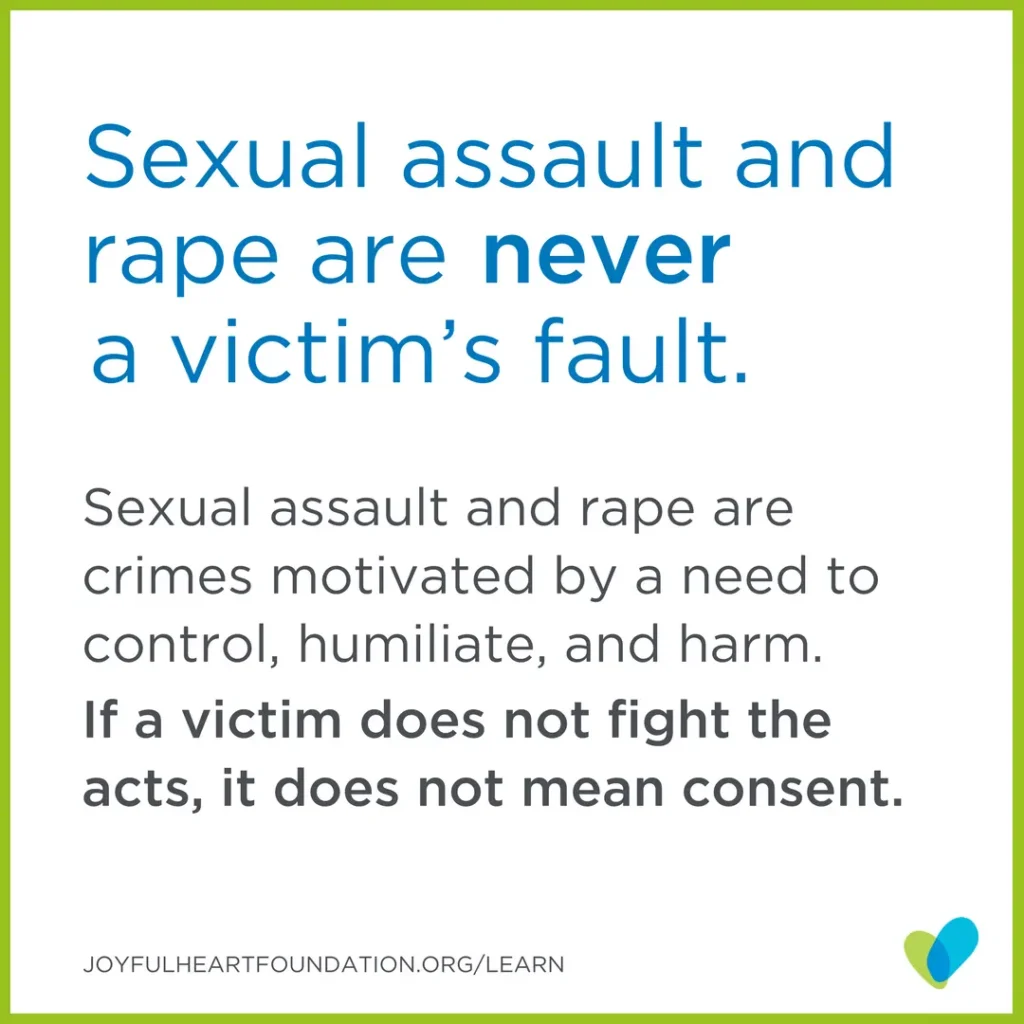
Image Source: joyfulheartfoundation.org/learn
One such term is “consent”. Sexual consent is an agreement between two or more people to engage in sexual activity. It requires all parties to understand what is occurring and freely agree to the activity. If one person does not understand what is happening or is coerced or forced into sexual activity, this cannot be considered consensual.
Another important legal term to know is the “statute of limitations.” This refers to the amount of time that a survivor has to pursue legal action after experiencing sexual assault. Depending on the location, this period can vary from one to seven years.
Legal Support Options
Once you have taken the initial steps after experiencing sexual assault and understand basic legal terminology, it’s time to explore your legal support options.
You may choose to hire an attorney to represent you throughout the legal process. A lawyer can provide valuable advice and help you understand the rights and protections afforded by law.
You may also be eligible for legal aid services, which provide free or reduced-cost legal assistance to those in need. Depending on your financial situation and the local resources available, legal aid can significantly reduce the cost of a lawyer and provide access to essential support throughout the process.
Hiring an Attorney
Many survivors of sexual assault don’t realize that there are lawyers who specialize in this area and can help you navigate all the legal aspects of your situation. Here are some tips for finding an experienced attorney:
- Ask around: Reach out to individuals in your network, including family members, friends, and colleagues, to ask for referrals.
- Search online: Look up local attorneys with expertise in sexual assault law.
- Contact legal aid: If you are eligible for reduced-cost or free legal services, contact your local legal aid office to find a qualified attorney who can help you.
- Call the Bar Association: The American Bar Association maintains a list of lawyers specializing in sexual assault law.
Self-Advocacy
Navigating the legal system after a sexual assault can be overwhelming and confusing. It’s important to remember that you have the right to self-advocate and make sure your voice is heard throughout the process.
Although this may be difficult, it’s essential to remember that you are in control. You have the right to speak up for yourself and ensure your needs are considered throughout the legal proceedings.
Being an advocate for yourself can help empower you during this difficult time. Seek out supportive people who will listen to you and provide emotional support as needed. When possible, take time for yourself and try to focus on the little things that bring you joy. Remember that you are a survivor and have the courage to face this challenge head-on.
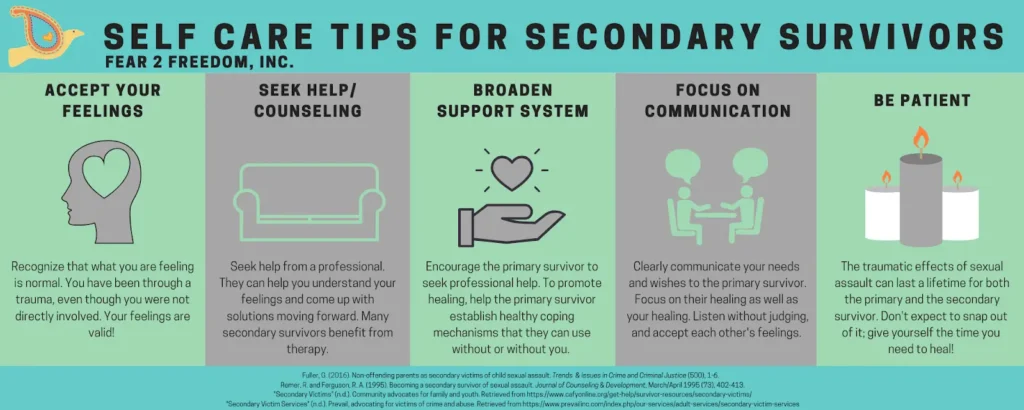
Image Source: fear2freedom.org
So, take time to educate yourself about your rights and protections under the law and speak up for yourself when necessary. Don’t be afraid to voice your concerns if something doesn’t feel right or you have a question. Your opinions and perspectives matter and should be taken into consideration throughout the process.
No matter which route you take, seeking legal support can help ensure that your rights and safety are protected. With the right resources, you can find the justice and closure you deserve.
The Future
Moving forward after experiencing sexual assault is no easy feat, but you are not alone. There are countless resources designed to help survivors seek justice and support them on their journey toward recovery. No matter what your situation may be, know that you have options and that there is a supportive network of advocates ready to stand with you.
It’s important to remember that your story is unique, and you have the strength to make it through this difficult time.
Do what works best for you, and take one day at a time. You can find peace and justice with the proper guidance, care, and support.
Seeking Professional Help
If you are experiencing any distress related to your experience, it is crucial to seek professional help. Counseling services can provide a safe and supportive space for survivors of sexual assault to process their emotions and gain clarity on their feelings.
You may also benefit from speaking with a family member or friend who can offer emotional support and understanding.
If you are unsure where to start, consider speaking with your primary care physician about counseling options in your area. Organizations such as the National Alliance on Mental Illness (NAMI) offer support groups and educational resources that can provide additional guidance on finding the right help for you.
No matter what your situation may be, know that there is help available. Do not hesitate to reach out and take the first steps towards recovery.
Supportive Resources During Legal Proceedings
Throughout your legal proceedings, there are some helpful resources you can turn to for support. Here are just a few:
- RAINN (Rape, Abuse & Incest National Network): This US-based organization provides a 24/7 sexual assault hotline and numerous other resources and information related to the legal process.
- End Rape on Campus: EROC is a student-led organization that provides resources, advice, and advocacy support for survivors of sexual assault on college campuses.
- National Alliance to End Sexual Violence: NAESV works to create social change through educational initiatives and public policy reform to end sexual violence.
- Sexual Assault Kit Initiative (SAKI) offers resources specifically related to sexual assault survivors, including information on sexual assault kits.
- NSVRC (National Sexual Violence Resource Center) provides a “Find Help” section with resources for sexual assault survivors.
- NAMI Massachusetts offers resources for people who have experienced sexual trauma, including support groups and counseling options.
- NJCASA (New Jersey Coalition Against Sexual Assault) provides resources tailored to survivors of sexual violence.
- Victim Connect Resource Center offers support and information on various types of crime, including sexual assault.
- A Guide for Friends and Family of Sexual Violence Survivors is available for those who want to support survivors in their lives.
- Enough Abuse provides survivor support resources, including information on healing and finding help.
No matter your situation, you have the right to seek justice and protection under the law. Take advantage of these resources, and remember you are not alone.
For personalized legal assistance and advocacy, get in touch with HMC Civil Rights. Our team is ready to stand with you. Call us today at 615-724-1996
Seeking Legal Redress
Seeking justice is an integral part of the healing journey for survivors of sexual assault, as it can provide a sense of closure and empower you to reclaim your life. Depending on your situation, you may be eligible for monetary compensation for damages associated with the attack.
For example, you may be able to file a civil lawsuit against your attacker to receive financial restitution for any physical or psychological harm caused by the attack.
Additionally, you may be eligible to receive money from the state’s victim’s compensation fund, which provides funds to survivors of violent crimes for medical expenses and other costs associated with the attack.
It is important to note that legal proceedings can be a complex and lengthy process, so it is best to consult an attorney who specializes in sexual assault law to understand your rights and options better. With the right legal guidance, you have the power to seek justice and start on the path toward recovery.
Summary
This guide provides a general overview of the legal steps a survivor of sexual assault should take after experiencing an attack. It is important to seek medical attention to check for physical injuries and obtain preventive medications.
Additionally, it’s important to understand basic legal terms such as “consent” and the “statute of limitations,” which will come up during your proceedings. Finally, several legal support options are available depending on your situation, such as hiring an attorney or seeking help from a legal aid organization.
Remember that you are not alone on your journey; a supportive network of advocates is ready to stand with you. Take advantage of the resources available, and remember that you have the strength to make it through this difficult time. Good luck!

Take Action with HMC Civil Rights Today
The path to legal restitution and recovery can seem daunting in a world where injustices sometimes feel overwhelming. Navigating the legal landscape, especially after a traumatic event like sexual assault, requires courage, determination, and, most importantly, support.
That’s where HMC Civil Rights steps in – a beacon of hope and justice in Tennessee. From Nashville to Columbia to Franklin to Murfreesboro, we fight tirelessly for those who need us most, standing up for their rights and giving voice to the voiceless.
Don’t let another moment pass by in uncertainty. Get your legal case reviewed today by the seasoned professionals at HMC Civil Rights.
Our dedicated attorneys are ready to analyze your case in detail, providing you with a clear understanding of your rights and the potential paths to justice. We’re committed to ensuring you’re not left in the dark during this crucial time.
Ready to take action? Don’t delay; act today! Use the form on this page to submit your case for review by the seasoned professionals at HMC Civil Rights. We’re committed to ensuring you’re not left in the dark during this crucial time.
